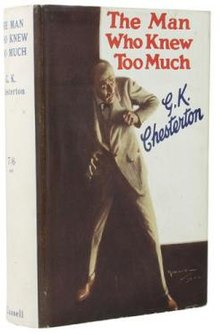
Gilbert Keith Chesterton was an English author, philosopher, Christian apologist, and literary and art critic.
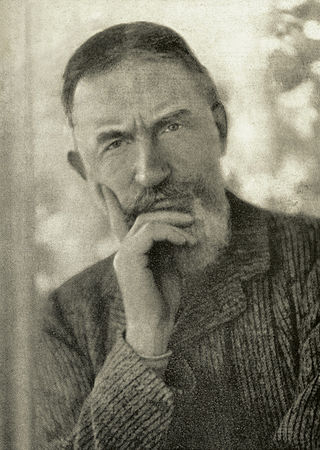
George Bernard Shaw, known at his insistence as Bernard Shaw, was an Irish playwright, critic, polemicist and political activist. His influence on Western theatre, culture and politics extended from the 1880s to his death and beyond. He wrote more than sixty plays, including major works such as Man and Superman (1902), Pygmalion (1913) and Saint Joan (1923). With a range incorporating both contemporary satire and historical allegory, Shaw became the leading dramatist of his generation, and in 1925 was awarded the Nobel Prize in Literature.
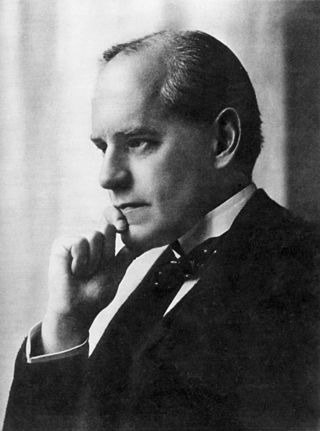
John Galsworthy was an English novelist and playwright. He is best known for his trilogy of novels collectively called The Forsyte Saga, and two later trilogies, A Modern Comedy and End of the Chapter. He was awarded the 1932 Nobel Prize in Literature.

Edmund Clerihew Bentley, who generally published under the names E. C. Bentley or E. Clerihew Bentley, was an English novelist and humorist, and inventor of the clerihew, an irregular form of humorous verse on biographical topics.

Herbert Henry Asquith, 1st Earl of Oxford and Asquith, generally known as H. H. Asquith, was a British statesman and liberal politician who was Prime Minister of the United Kingdom from 1908 to 1916. He was the last Liberal Party prime minister to command a majority government, and the most recent Liberal to have served as Leader of the Opposition. He played a major role in the design and passage of major liberal legislation and a reduction of the power of the House of Lords. In August 1914, Asquith took Great Britain and the British Empire into the First World War. During 1915, his government was vigorously attacked for a shortage of munitions and the failure of the Gallipoli Campaign. He formed a coalition government with other parties but failed to satisfy critics, was forced to resign in December 1916 and never regained power.

The Irish War of Independence or Anglo-Irish War was a guerrilla war fought in Ireland from 1919 to 1921 between the Irish Republican Army and British forces: the British Army, along with the quasi-military Royal Irish Constabulary (RIC) and its paramilitary forces the Auxiliaries and Ulster Special Constabulary (USC). It was part of the Irish revolutionary period.
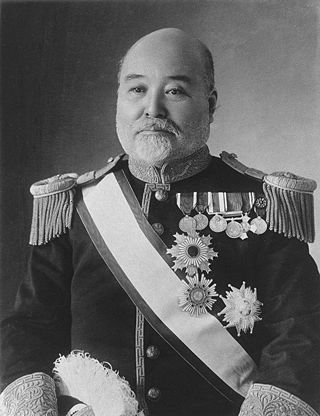
Viscount Takahashi Korekiyo was a Japanese politician who served as prime minister of Japan from 1921 to 1922 and Minister of Finance when he was assassinated. He was also a member of the House of Peers and head of the Bank of Japan.

The Mysterious Affair at Styles is the first detective novel by British writer Agatha Christie, introducing her fictional detective Hercule Poirot. It was written in the middle of the First World War, in 1916, and first published by John Lane in the United States in October 1920 and in the United Kingdom by The Bodley Head on 21 January 1921.

Pietro Badoglio, 1st Duke of Addis Abeba, 1st Marquess of Sabotino, was an Italian general during both World Wars and the first viceroy of Italian East Africa. With the fall of the Fascist regime in Italy, he became Prime Minister of Italy.
The Man Who Knew Too Much may refer to:

The 1922 United Kingdom general election was held on Wednesday 15 November 1922. It was won by the Conservative Party, led by Prime Minister Andrew Bonar Law, which gained an overall majority over the Labour Party, led by J. R. Clynes, and a divided Liberal Party.

Frederick Schiller Faust was an American writer known primarily for his Western stories using the pseudonym Max Brand. As Max Brand, he also created the popular fictional character of young medical intern Dr. James Kildare for a series of pulp fiction stories. His Kildare character was subsequently featured over several decades in other media, including a series of American theatrical movies by Paramount Pictures and Metro-Goldwyn-Mayer (MGM), a radio series, two television series, and comics. Faust's other pseudonyms include George Owen Baxter, Evan Evans, Peter Dawson, David Manning, John Frederick, Peter Henry Morland, George Challis, and Frederick Frost. He also wrote under his real name. As George Challis, Faust wrote the "Tizzo the Firebrand" series for Argosy magazine. The Tizzo saga was a series of historical swashbuckler stories, featuring the titular warrior, set in Renaissance Italy.

Maurice Baring was an English man of letters, known as a dramatist, poet, novelist, translator and essayist, and also as a travel writer and war correspondent, with particular knowledge of Russia. During World War I, Baring served in the Intelligence Corps and Royal Air Force.
The Marconi scandal was a British political scandal that broke in mid-1912. Allegations were made that highly placed members of the Liberal government under the Prime Minister H. H. Asquith had profited by improper use of information about the government's intentions with respect to the Marconi Company. They had known that the government was about to issue a lucrative contract to the British Marconi company for the Imperial Wireless Chain and had bought shares in an American subsidiary.
This is a list of the books written by G. K. Chesterton.

The Man Who Knew Too Much is a 1934 British spy thriller film directed by Alfred Hitchcock, featuring Leslie Banks and Peter Lorre, and released by Gaumont British. It was one of the most successful and critically acclaimed films of Hitchcock's British period.

The Partition of Ireland was the process by which the Government of the United Kingdom of Great Britain and Ireland (UK) divided Ireland into two self-governing polities: Northern Ireland and Southern Ireland. It was enacted on 3 May 1921 under the Government of Ireland Act 1920. The Act intended both territories to remain within the United Kingdom and contained provisions for their eventual reunification. The smaller Northern Ireland was duly created with a devolved government and remained part of the UK. The larger Southern Ireland was not recognised by most of its citizens, who instead recognised the self-declared 32-county Irish Republic. On 6 December 1922, Ireland was partitioned. At that time, the territory of Southern Ireland left the UK and became the Irish Free State, now known as the Republic of Ireland. Ireland had a large Catholic, nationalist majority who wanted self-governance or independence. Prior to partition the Irish Home Rule movement compelled the British Parliament to introduce bills that would give Ireland a devolved government within the UK. This led to the Home Rule Crisis (1912–14), when Ulster unionists/loyalists founded a large paramilitary organization, the Ulster Volunteers, that could be used to prevent Ulster from being ruled by an Irish government. The British government proposed to exclude all or part of Ulster, but the crisis was interrupted by the First World War (1914–18). Support for Irish independence grew during the war and after the 1916 armed rebellion known as the Easter Rising.
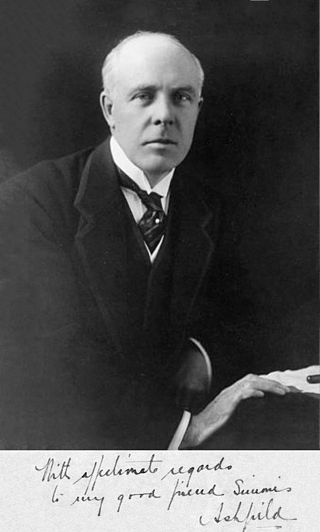
Albert Henry Stanley, 1st Baron Ashfield,, born Albert Henry Knattriess, was a British-American businessman who was managing director, then chairman of the Underground Electric Railways Company of London (UERL) from 1910 to 1933 and chairman of the London Passenger Transport Board (LPTB) from 1933 to 1947.

The Book of Fantasy is the English translation of Antología de la literatura fantástica, an anthology of approximately 81 fantastic short stories, fragments, excerpts, and poems edited by Jorge Luis Borges, Adolfo Bioy Casares, and Silvina Ocampo. It was first published in Argentina in 1940, and revised in 1965 and 1976. Anthony Kerrigan had previously translated a similar work by the same editors, Cuentos breves y extraordinarios (1955) as Extraordinary Tales, published by Herder & Herder in 1971. The 1988 Viking Penguin edition for English-speaking countries includes a foreword by Ursula K. Le Guin.
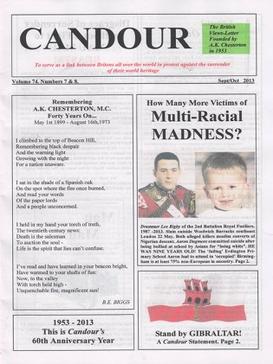
Candour is a British far-right political magazine founded by journalist and political activist A. K. Chesterton, appearing weekly from 1953 to 1960, and in to eight to ten issues per year by 1999, and irregularly published as of 2022.
